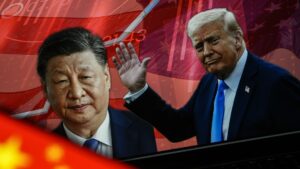China’s Strategic Shift in Economic Warfare: A Deep Dive
In the ever-evolving landscape of global trade, recent developments signify that the trade war between China and the United States is entering a new and potentially more volatile phase. At Extreme Investor Network, we believe it’s essential to analyze these trends not just at face value but to understand their broader implications for investors and businesses alike.
The Changing Dynamics of Tariffs and Retaliation
Just last week, China publicly dismissed U.S. President Donald Trump’s escalating tariffs, referring to any further increases from the U.S. as a "joke." Instead of playing the tariff tit-for-tat game, which has seen levies on some goods escalating as high as 245%, China is strategically shifting its focus. This reflects a sophisticated understanding of economic warfare by employing alternative measures aimed specifically at the U.S. services sector.
While the Trump administration continues to assert its dominance through aggressive tariff imposition, China has chosen to adopt a broader, multifaceted strategy. Among these measures are enhanced export controls on rare-earth minerals—essential resources for technology and defense sectors—and investigations into American companies, such as DuPont and Google. By targeting these high-profile entities, Beijing is hoping to send a clear message: the stakes are rising.
This ongoing saga has seen U.S. companies like Boeing facing immense pressure, particularly after orders were issued to halt jet deliveries to Chinese airlines. Such actions not only worsen operational challenges for these firms, which are already grappling with quality-control issues, but they also highlight China’s capability to create economic fatigue in American businesses. At Extreme Investor Network, we monitor these shifts closely, providing insights to help investors navigate potential turbulence in trade relations.
Expanding Target: The Services Sector
Interestingly, analysts speculate that the trade conflict may soon expand to encompass services—a critical area where the U.S. significantly outperforms China. The U.S. services trade surplus with China skyrocketed over the past two decades, highlighting a golden opportunity for punitive measures from Beijing.
China is eyeing sectors like legal consultancy, financial services, and travel—areas where the U.S. has thrived. As Beijing considers potential restrictions on American firms in these sectors, the ramifications could be profound. For instance, recent rumors indicate that curbs might be placed on U.S. legal firms operating in China, while citizens are being cautioned against traveling to the U.S. All of these are signs that the Chinese government aims to maintain its ground and protect its market interests.
At Extreme Investor Network, we offer an analytical lens through which to view these shifts, allowing investors to better position themselves in light of these fluctuating dynamics.
Analyzing the Potential for Escalation
Every action in economic warfare has the potential to backfire, and many analysts believe that as China continues to deploy non-tariff measures, the risk of heightened tension increases. Key players like Apple, Tesla, and various pharmaceutical companies could soon find themselves in the crosshairs of Beijing’s strategy.
As the trade war unfolds, discussions of possible negotiations between China and the U.S. are becoming less optimistic. China’s "bullying" sentiments regarding U.S. tariffs and its insistence that any talks must occur "on an equal footing" signify that we are nowhere close to a resolution.
What Lies Ahead?
As the interplay between the two largest economies intensifies, the economic decoupling is becoming more pronounced, affecting not just bilateral trade but also the very fabric of business relationships—investors need to be vigilant.
At Extreme Investor Network, we commit to delivering timely insights into shifting geopolitical landscapes and their economic implications. Understanding these factors isn’t just a strategy for wealth preservation; it’s a means to harness opportunity in the face of adversity.
For more analysis like this, make sure to follow our updates as we navigate these turbulent waters together, ensuring that you are well-prepared for whatever the future holds in global trade.

